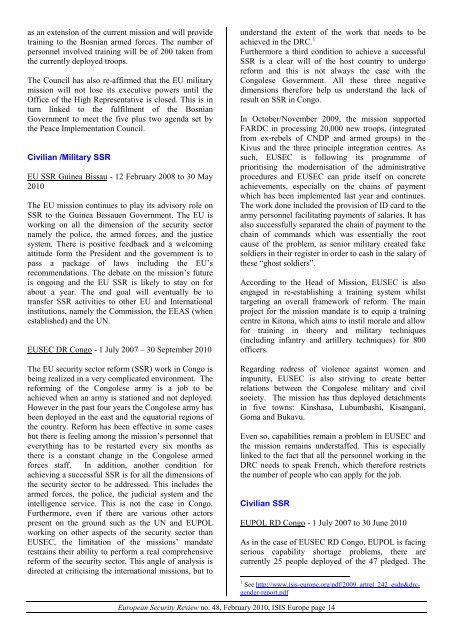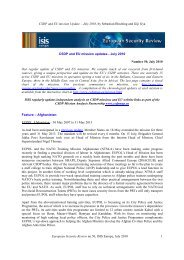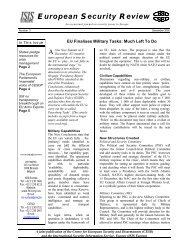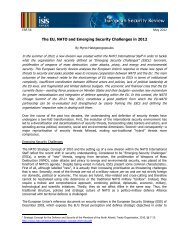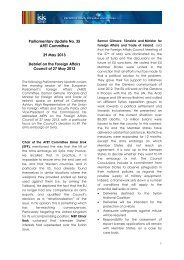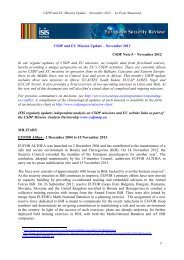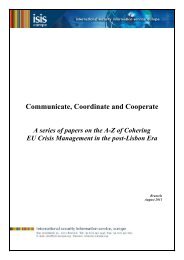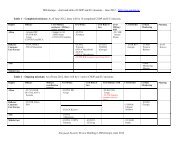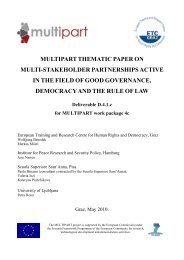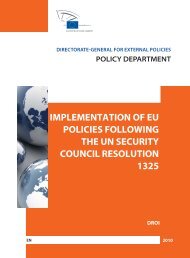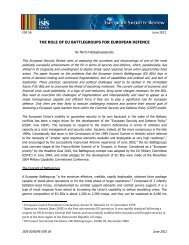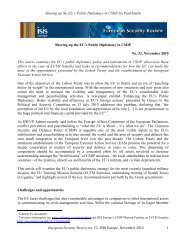ISIS Europe News In This Issue
ISIS Europe News In This Issue
ISIS Europe News In This Issue
You also want an ePaper? Increase the reach of your titles
YUMPU automatically turns print PDFs into web optimized ePapers that Google loves.
as an extension of the current mission and will provide<br />
training to the Bosnian armed forces. The number of<br />
personnel involved training will be of 200 taken from<br />
the currently deployed troops.<br />
The Council has also re-affirmed that the EU military<br />
mission will not lose its executive powers until the<br />
Office of the High Representative is closed. <strong>This</strong> is in<br />
turn linked to the fulfilment of the Bosnian<br />
Government to meet the five plus two agenda set by<br />
the Peace Implementation Council.<br />
Civilian /Military SSR<br />
EU SSR Guinea Bissau - 12 February 2008 to 30 May<br />
2010<br />
The EU mission continues to play its advisory role on<br />
SSR to the Guinea Bissauen Government. The EU is<br />
working on all the dimension of the security sector<br />
namely the police, the armed forces, and the justice<br />
system. There is positive feedback and a welcoming<br />
attitude form the President and the government is to<br />
pass a package of laws including the EU’s<br />
recommendations. The debate on the mission’s future<br />
is ongoing and the EU SSR is likely to stay on for<br />
about a year. The end goal will eventually be to<br />
transfer SSR activities to other EU and <strong>In</strong>ternational<br />
institutions, namely the Commission, the EEAS (when<br />
established) and the UN.<br />
EUSEC DR Congo - 1 July 2007 – 30 September 2010<br />
The EU security sector reform (SSR) work in Congo is<br />
being realized in a very complicated environment. The<br />
reforming of the Congolese army is a job to be<br />
achieved when an army is stationed and not deployed.<br />
However in the past four years the Congolese army has<br />
been deployed in the east and the equatorial regions of<br />
the country. Reform has been effective in some cases<br />
but there is feeling among the mission’s personnel that<br />
everything has to be restarted every six months as<br />
there is a constant change in the Congolese armed<br />
forces staff. <strong>In</strong> addition, another condition for<br />
achieving a successful SSR is for all the dimensions of<br />
the security sector to be addressed. <strong>This</strong> includes the<br />
armed forces, the police, the judicial system and the<br />
intelligence service. <strong>This</strong> is not the case in Congo.<br />
Furthermore, even if there are various other actors<br />
present on the ground such as the UN and EUPOL<br />
working on other aspects of the security sector than<br />
EUSEC, the limitation of the missions’ mandate<br />
restrains their ability to perform a real comprehensive<br />
reform of the security sector. <strong>This</strong> angle of analysis is<br />
directed at criticising the international missions, but to<br />
understand the extent of the work that needs to be<br />
achieved in the DRC. 1<br />
Furthermore a third condition to achieve a successful<br />
SSR is a clear will of the host country to undergo<br />
reform and this is not always the case with the<br />
Congolese Government. All these three negative<br />
dimensions therefore help us understand the lack of<br />
result on SSR in Congo.<br />
<strong>In</strong> October/November 2009, the mission supported<br />
FARDC in processing 20,000 new troops, (integrated<br />
from ex-rebels of CNDP and armed groups) in the<br />
Kivus and the three principle integration centres. As<br />
such, EUSEC is following its programme of<br />
prioritising the modernisation of the administrative<br />
procedures and EUSEC can pride itself on concrete<br />
achievements, especially on the chains of payment<br />
which has been implemented last year and continues.<br />
The work done included the provision of ID card to the<br />
army personnel facilitating payments of salaries. It has<br />
also successfully separated the chain of payment to the<br />
chain of commands which was essentially the root<br />
cause of the problem, as senior military created fake<br />
soldiers in their register in order to cash in the salary of<br />
these “ghost soldiers”.<br />
According to the Head of Mission, EUSEC is also<br />
engaged in re-establishing a training system whilst<br />
targeting an overall framework of reform. The main<br />
project for the mission mandate is to equip a training<br />
centre in Kitona, which aims to instil morale and allow<br />
for training in theory and military techniques<br />
(including infantry and artillery techniques) for 800<br />
officers.<br />
Regarding redress of violence against women and<br />
impunity, EUSEC is also striving to create better<br />
relations between the Congolese military and civil<br />
society. The mission has thus deployed detachments<br />
in five towns: Kinshasa, Lubumbashi, Kisangani,<br />
Goma and Bukavu.<br />
Even so, capabilities remain a problem in EUSEC and<br />
the mission remains understaffed. <strong>This</strong> is especially<br />
linked to the fact that all the personnel working in the<br />
DRC needs to speak French, which therefore restricts<br />
the number of people who can apply for the job.<br />
Civilian SSR<br />
EUPOL RD Congo - 1 July 2007 to 30 June 2010<br />
As in the case of EUSEC RD Congo, EUPOL is facing<br />
serious capability shortage problems, there are<br />
currently 25 people deployed of the 47 pledged. The<br />
1 See http://www.isis-europe.org/pdf/2009_artrel_242_esdp&drcgender-report.pdf<br />
<strong>Europe</strong>an Security Review no. 48, February 2010, <strong>ISIS</strong> <strong>Europe</strong> page 14


